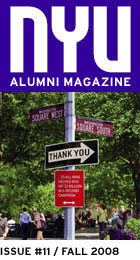writing/directing
Life After The Ending
Sopranos creator David Chase says goodbye to the medium—and the show—that made him famous
by Jason Hollander / GAL ’07
Are you over it? It’s been nearly 16 months since your TV cut to black—with Meadow hustling toward the diner and Tony chomping on Jersey’s best onion rings. And then there was silence, and an obligatory roll of credits. And we were left, mouths agape, to sit with existential thoughts on the concept of closure and the ticking seconds of our lives—a mood more typically inspired by Shakespearean drama than cable television. Then again, as New Yorker editor David Remnick once wrote, “The Sopranos defied Aristotelian conventions.”So, really, are you over it? It’s okay if you’re not.
But David Chase (WSC ’68), creator and executive producer of HBO’s eight–year–long, 86–episode cultural phenomenon, has moved on. At the ripe age of 63, he just signed his first contract to write, direct, and produce a feature film—fulfilling the life–long dream that started in the same New Jersey town, North Caldwell, that Tony calls home (assuming he’s still alive, that is). Chase wrote a few screenplays in the 1980s that were never made, but his current star power helped ink a deal last spring with Paramount CEO Brad Grey, a former Sopranos co–executive producer. While the journey to the big screen may have taken longer than Chase hoped, he’ll have unusual control for a first–time writer/ director. “I’m not complaining,” he says. “Since I’ve got some heat off the show, people are more interested in what I have to say.”
Die–hard Sopranos fans should keep their expectations in check, though; there will be no goons named Paulie Walnuts or Big Pussy. Chase is deciding between two ideas for his film: one set in the Jersey suburbs familiar to his audiences, the other a departure he’s sure would “surprise” them. In either case, the goal remains to entertain, most likely by way of his penchant for things “mysterious, murky, sad, and strange.” Astute observers might even recognize some familiar preoccupations. “I think there will be elements that will seem similar because it’s the same person,” Chase explains. “I mean, every time you pick up a book, you know, Kurt Vonnegut is Kurt Vonnegut.”
One mainstay throughout Chase’s more than 30–year television career has been a prolificacy enviable to many writers. His first major gig was penning Kolchak: The Night Stalker, followed by writing and producing jobs on The Rockford Files, Almost Grown, I’ll Fly Away, and Northern Exposure. That body of work, along with The Sopranos, garnered seven Emmys, a Golden Globe, and two Peabodys, as well as awards from the writers, directors, and producers guilds of America. The bang–it–out, boot–camp pace of network TV forced Chase to stay focused and, more important, has kept the concept of being creatively “blocked” out of his vocabulary. “It’s not something that —and I’m knocking wood now—I’ve ever thought about,” he says. “You just had to get the stuff out there because they were waiting to shoot it. But I do have doubts all the time.”
As good as television has been to him, Chase never faked any affinity for the medium, telling The New York Times in 2004 that he finds American TV consumption “divisive” and “isolating,” and his reason for working in it unabashedly simple: “I did it for the money.” Still, he did pour his heart into some shows and went out with a series as critically acclaimed as any in TV history. Even if his cinematic career someday eclipses his small–screen feats, The Sopranos will easily endure as “one of the greatest experiences” of Chase’s life. And while he’s been asked just about every question possible, he’s saddened to think of the time when people might no longer be interested in the show. “If I ever get to be 85,” he laughs, “I’m gonna be talking about [The Sopranos] every minute.”
Luckily, the hullabaloo caused by that “ambiguous” ending should keep others talking, and studying it, for years to come. On that farewell night of June 10, 2007, Web chat rooms teemed with those enraged, enchanted, or just confused. Morning news shows dissected the final shots. TV journalists constructed elaborate theories based on bit players from old episodes, a “guy who knows a guy who was on the set,” and the glaze in Tony’s eyes at the very end. As for Chase, who wrote the last episode himself, the answers are all right there. “That was the proper ending for that story,” he says. “I had no interest in seeing Tony Soprano go to prison. It would’ve been easy as hell to have him shot. Plenty of people could’ve killed him, and maybe somebody did. We don’t know.”
Absence of the absolute is part of coming to grips with a life that defies dichotomy—“chiasmic unity,” as Nietzsche called it—and something that Tony, and audiences, grappled with throughout the series. Can a man be both a loving father and stone–faced killer in the same afternoon? Can he live an unusually vibrant life under the suffocating shadow of impending doom? This intertwining makes the ending “proper,” as Chase insists, because it’s a universal experience. “Not to be too philosophical, but at any minute it’s gonna happen to all of us,” he says. “That’s the story of The Sopranos. It’s about life and death, you know?”
Chase never faked any affinity for TV, saying he finds it “divisive” and “isolating.” He admits: “I did it for the money.”







